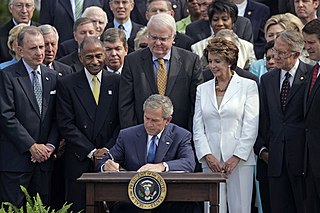
The USA PATRIOT Act was a landmark Act of the United States Congress, signed into law by President George W. Bush. The formal name of the statute is the Uniting and Strengthening America by Providing Appropriate Tools Required to Intercept and Obstruct Terrorism Act of 2001, and the commonly used short name is a contrived acronym that is embedded in the name set forth in the statute.

The Children's Health Insurance Program (CHIP) – formerly known as the State Children's Health Insurance Program (SCHIP) – is a program administered by the United States Department of Health and Human Services that provides matching funds to states for health insurance to families with children. The program was designed to cover uninsured children in families with incomes that are modest but too high to qualify for Medicaid. The program was passed into law as part of the Balanced Budget Act of 1997, and the statutory authority for CHIP is under title XXI of the Social Security Act.

Christopher Henry Smith is an American politician serving his 22nd term as the U.S. representative for New Jersey's 4th congressional district. Though it has taken various forms, his district has always been situated in central New Jersey. Currently, the district contains parts of Ocean and Monmouth counties. Smith is a member of the Republican Party, having switched from the Democratic Party in 1978.

The Foreign Intelligence Surveillance Act of 1978 is a United States federal law that establishes procedures for the surveillance and collection of foreign intelligence on domestic soil.

The Violence Against Women Act of 1994 (VAWA) is a United States federal law signed by President Bill Clinton on September 13, 1994. The Act provided $1.6 billion toward investigation and prosecution of violent crimes against women, imposed automatic and mandatory restitution on those convicted, and allowed civil redress when prosecutors chose to not prosecute cases. The Act also established the Office on Violence Against Women within the U.S. Department of Justice.

The Public Health Service Act is a United States federal law enacted in 1944. The full act is codified in Title 42 of the United States Code, Chapter 6A . This Act provided a legislative basis for the provision of public health services in the United States.

Signed into U.S. law by President George W. Bush on October 18, 2004, the North Korean Human Rights Act was intended to promote human rights and freedom of North Korean refugees by:
- Providing humanitarian assistance to North Koreans inside North Korea;
- Providing grants to private, non-profit organizations to promote human rights, democracy, rule of law, and the development of a market economy in North Korea;
- Increasing the availability of information inside North Korea;
- Providing humanitarian or legal assistance to North Koreans who have fled North Korea.

The history of the USA PATRIOT Act involved many parties who opposed and supported the legislation, which was proposed, enacted and signed into law 45 days after the September 11 terrorist attacks in 2001. The USA PATRIOT Act, though approved by large majorities in the U.S. Senate and House of Representative, was controversial, and parts of the law were invalidated or modified by successful legal challenges over constitutional infringements to civil liberties. The Act had several sunset provisions, most reauthorized by the USA PATRIOT Improvement and Reauthorization Act of 2005 and the USA PATRIOT Act Additional Reauthorizing Amendments Act. Both reauthorizations incorporated amendments to the original USA PATRIOT Act, and other federal laws.
Belsat is a Polish free-to-air terrestrial and satellite television channel aimed at Belarus. The channel is a subsidiary of TVP S.A. From the outset, it has been co-funded by the Polish Ministry of Foreign Affairs and international donors.

The Victims of Trafficking and Violence Protection Act of 2000 (TVPA) is a federal statute passed into law in 2000 by the U.S. Congress and signed by President Clinton. The law was later reauthorized by presidents Bush, Obama, and Trump. In addition to its applicability to US citizens, it has the ability to authorize protections for undocumented immigrants who are victims of severe forms of trafficking and violence.

The FISA Amendments Act of 2008, also called the FAA and Foreign Intelligence Surveillance Act of 1978 Amendments Act of 2008, is an Act of Congress that amended the Foreign Intelligence Surveillance Act. It has been used as the legal basis for surveillance programs disclosed by Edward Snowden in 2013, including PRISM.

The Debbie Smith Act of 2004 provides United States federal government grants to eligible states and units of local government to conduct DNA analyses of backlogged DNA samples collected from victims of crimes and criminal offenders. The Act expands the Combined DNA Index System (CODIS) and provides legal assistance to survivors of dating violence. Named after sexual assault survivor Debbie Smith, the Act was passed by the 108th Congress as part of larger legislation, the Justice for All Act of 2004, and signed into law by President George W. Bush on October 30, 2004. The Act amended the DNA Analysis Backlog Elimination Act of 2000, the DNA Identification Act of 1994, the Violence Against Women Act of 2000, and the Uniform Code of Military Justice. The Act was reauthorized in 2008, extending the availability of DNA backlog reduction program grants, DNA evidence training and education program grants, and sexual assault forensic exam program grants through fiscal year 2014.

The U.S. Congress enacted major amendments to the Voting Rights Act of 1965 in 1970, 1975, 1982, 1992, and 2006. Each of these amendments coincided with an impending expiration of some of the Act's special provisions, which originally were set to expire by 1970. However, in recognition of the voting discrimination that continued despite the Act, Congress repeatedly amended the Act to reauthorize the special provisions.

The Combating Autism Reauthorization Act of 2014 or Autism Collaboration, Accountability, Research, Education, and Support Act of 2014 or Autism CARES Act of 2014 is a United States federal law that amended the Public Health Service Act to reauthorize research, surveillance, and education activities related to autism spectrum disorders (autism) conducted by various agencies within the United States Department of Health and Human Services (HHS). The bill authorizes $1.3 billion in funding for fiscal years 2015–2019.
The Safe and Accurate Food Labeling Act was an American bill that died in 2016 but not before it influenced Public Law 114-214 in Committee. The purpose of both bills was to amend the Agricultural Marketing Act of 1946. The competitor legislation was signed into law by President Obama on 29 July 2016.

The Frank R. Lautenberg Chemical Safety for the 21st Century Act is a law passed by the 114th United States Congress and signed into law by US President Barack Obama in 2016. Administered by the United States Environmental Protection Agency, which regulates the introduction of new or already existing chemicals, the Act amends and updates the Toxic Substances Control Act (TSCA) that went into force in 1976.

The Hong Kong Human Rights and Democracy Act of 2019 (HKHRDA) is a United States federal law that requires the U.S. government to impose sanctions against mainland China and Hong Kong officials considered responsible for human rights abuses in Hong Kong, and requires the United States Department of State and other agencies to conduct an annual review to determine whether changes in Hong Kong's political status justify changing the unique, favorable trade relations between the U.S. and Hong Kong. The passage of the bill was supported by pro-democracy activists in Hong Kong, and in 2019 received near-unanimous support in Congress.
The Emmett Till Unsolved Civil Rights Crime Act is an Act of the United States Congress introduced by John Lewis (GA-5) that allows the reopening of cold cases of suspected violent crimes committed against African Americans before 1970. The U.S. House of Representatives passed the legislation on June 20, 2007, by a vote of 422 to 2. The U.S. Senate passed the legislation on September 24, 2008, by unanimous consent, and President George W. Bush signed the bill into law on October 7.

The Richard L. TrumkaProtecting the Right to Organize Act, or PRO Act, is a proposed United States law that would amend previous labor laws such as the National Labor Relations Act, for the purpose of expanding "various labor protections related to employees' rights to organize and collectively bargain in the workplace". It would prevent employers from holding mandatory meetings for the purpose of counteracting labor organization, and would strengthen the legal right of employees to join a labor union. The bill would also permit labor unions to encourage secondary strikes. The PRO Act would weaken "right-to-work" laws, which exist in 27 U.S. states. It would allow the National Labor Relations Board to fine employers for violations of labor law, and would provide compensation to employees involved in such cases. It is named after Richard Trumka who was the President of the AFL-CIO until his death in August 5, 2021.




